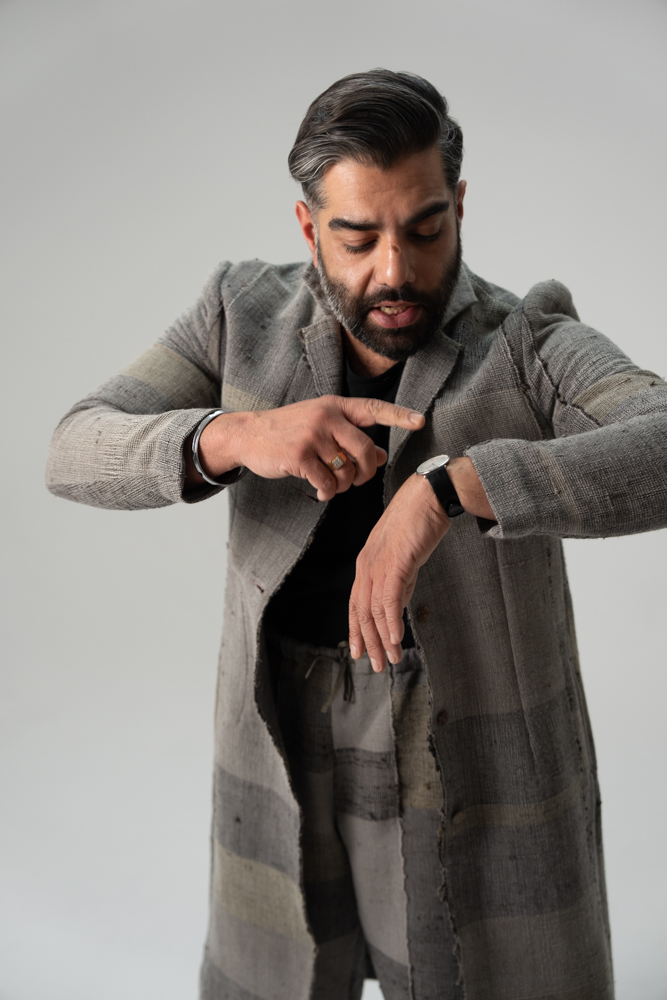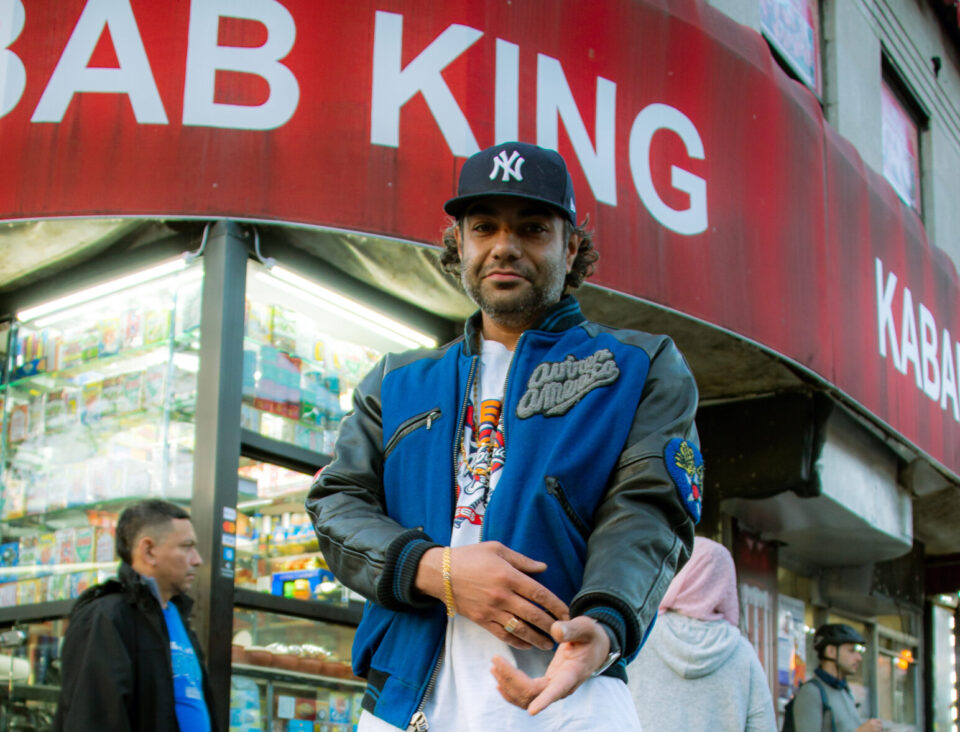Heems’ New Album ‘Veena’: ‘I Really Wanted to Make Multiple Worlds Around This’
Desi American hip-hop artist has released his second album this year, and it’s filled with skits by filmmaker Zoya Akhtar, comedian Hasan Minhaj, singer-songwriter Ankur Tewari and more
Heems is a conversationalist, in the way that an interviewee wants me to feel comfortable about talking to him. He’s finding a space to settle down for our chat. “I’ll turn my video on so that you can read my body language like an FBI profiler,” he says half a minute into talking over a call.
As polite as he is, Heems aka Himanshu Suri is a beast on the mic still, as we hear on the lead single “Manto” off his new album Veena. Produced by Sid Vashi and featuring pianist Vijay Iyer, the monochrome music video directed by filmmaker and writer Nardeep Khurmi strikes hard at the mental scars that immigrants like Heems’ family have survived. Heems sits on a chair in the middle of a market area, his grey streaks of hair pretty prominent, but he doesn’t age when it comes to rage on songs like “Manto.”
While talking about the track ahead of the album’s release, he points out how too many people have been using the famed Punjabi Deli spot in New York as a backdrop for the visuals, whether it’s musicians or creators. “I worked hard to get that taxi stand over there, that’s a personal thing. That’s my spot,” he says. As a pioneer of hip-hop who worked in desi references in English rap in the U.S. far before it became a movement with labels and ecosystems, Heems says he’s never been as straightforward in his career as he is on the 11-track Veena. “I obviously use different defense mechanisms like humor, or sometimes guitar to undermine the vulnerability, but this is me putting it out there,” he adds.
Out via his own label Veena Sounds on Aug. 23, this is Heems’ second album this year, following the early 2024 album Lafandar with producer Lapgan. Veena, for its part, is chiefly produced by Sid Vashi, but also the anonymous Ram Dulari and Lapgan as well, on the final track “Righteous.”
“Manto” references the partition literature figure S.H. Manto. “I think his rawness and straightforwardness and ability to be very honest and real is something that in many ways is a part of rap music as well,” Heems says.
Veena also has “Bourdain,” which is a reference to late culinary veteran Anthony Bourdain and features rapper Mr. Cheeks over a booming beat. Heems chatted with Bourdain and became friends, which was clear to see in a 2017 episode of the chef’s Parts Unknown. But it’s not a dedication, as Heems points out. “They are a part of a pastiche of work. I tend to use these names as titles because it feels like better marketing,” he says, pausing and then laughing.
With Veena, Heems says he’s worked in a lot of different sides – from his interest in post-partition Indian film, language and more – to “try and find the through line.” That’s why it’s only apt that it’s released via Veena Co (Mass Appeal is also involved as label for this album) – which is described in a press release as a “multi-local music business.” It has Veena Music, which is the label, as well as Veena Direct, which aims to take merchandising beyond vinyl and T-shirts to sell organic coconut oil and shawls, among other things.
Heems wrote three singles in three days for Veena but most of the work began a year ago. “I like to kind of leave things out there in a certain kind of rawness or not have things be too pristine. I think Sid’s role as a producer was to, in some ways, clean that up,” he says. Taking these songs – and ones that will be part of a third album – was “very difficult” according to the rapper. “It’s the notion that therapists talk about – sitting with your feelings,” he says. Being a New Yorker in terms of pace and Punjabi in terms of cultural outlook, Heems laughs about how this is the longest he sat with songs about a breakup, chemical dependency and his dog dying. “It was like a fucking year.”
On “Bourdain,” there are sharp takedowns like, “People think they allies ‘cause they ate a little gobi (aloo gobi).” A lot of the tone on the album is certainly confrontational, but there’s also funnier, adventure-set songs like “Ratatouille” in the way he’d done with Das Racist and as a solo artist. “Then there are songs which are very much out of my range,” he says. That’s likely songs like the drill track “Rakhi,” featuring Pavvan and Ajji, and the openhearted “Flowers,” featuring Tamil-Canadian artist Navz-47. Packed is the best way to describe “Dame,” which starts off like a hyper-pop track and settles into a glitchy rhythm.
Other than Heems and the rappers, Veena has voicemails by some very prominent people, heard across two skits – “Underbelly” and “Juhi.” Everyone from Zoya Akhtar (urging him to “write that script”), Hasan Minhaj (offering dating advice and referencing the Bollywood movie Darr) to Arooj Aftab (checking in on her friend), Yo Yo Honey Singh (who is hyped for his album), Utkarsh Ambudkar (finding his new favorite album from Heems), rock band No Doubt’s Tony Kanal, singer-producer Ritviz, artist Ranbir Kaleka and more send in voicemails. There’s also Swet Shop Boys co-founder Riz Ahmed on “Righteous” checking in on his friend. Veena ends with singer-songwriter Ankur Tewari’s voicemail praising the album, his verdict of “nice” echoing all the way out.
Understandably, these voicemails were a reflection of the heartwarming response he got from his friends and the larger community for his recent music. It also continues the tradition of voicemails sampled in hip-hop and Heems is understandably excited for people to hear it. “I wanted the homies on there,” he says. He specifically shouts out actor Poorna Jagannathan talking to him about the need for darker films, just trading notes on something as crucial as color grading. “It becomes a look inside a community and how they work with each other and how they talk with one another and how they take care of one another […] I wanted to make multiple worlds around this record. Also, it’s just self-obsessed name-dropping,” Heems says.

Heems’ prolific output in 2024 – the third album that follows Lafandar and Veena will likely be out this year – is coming at a time when a lot more eyes are on Indian and Indian-origin artists across genres. The rapper acknowledges the likes of Prateek Kuhad and Peter Cat Recording Co., even DIVINE but says he doesn’t think about whether Das Racist or his music would’ve been more impactful in today’s TikTok age necessarily. “I don’t think the music was made to be any bigger than it was,” he says.
He also doesn’t want to “work on a big scale” with Veena Co. and prefers his place in hip-hop lore. “I don’t want the pieces to be the size of a wall with very intricate details. I want to write a word on a postcard and hand it over to you,” Heems says.
Nevertheless, he’s making moves with Veena Music, enlisting Azadi Records co-founder Uday Kapur to scope out artists – Indian and otherwise – to sign as a label. “I probably am more in tune with what’s going on musically in India than, you know, I have ever been before,” the rapper says.
Heems name-checks a few upcoming artists, including Dakhni rapper Pasha Bhai from Bengaluru and New Delhi-based Kinari. “I think she’s probably my favorite rapper in India right now.” He doesn’t necessarily wish that artists eventually find their market in the U.S., move here and claim that they’ve made it. He adds as way of advice, “This country [the U.S.] is terrible and does terrible things to people. So come here once or twice and then find a better place, make it your home and your utopian society.”








